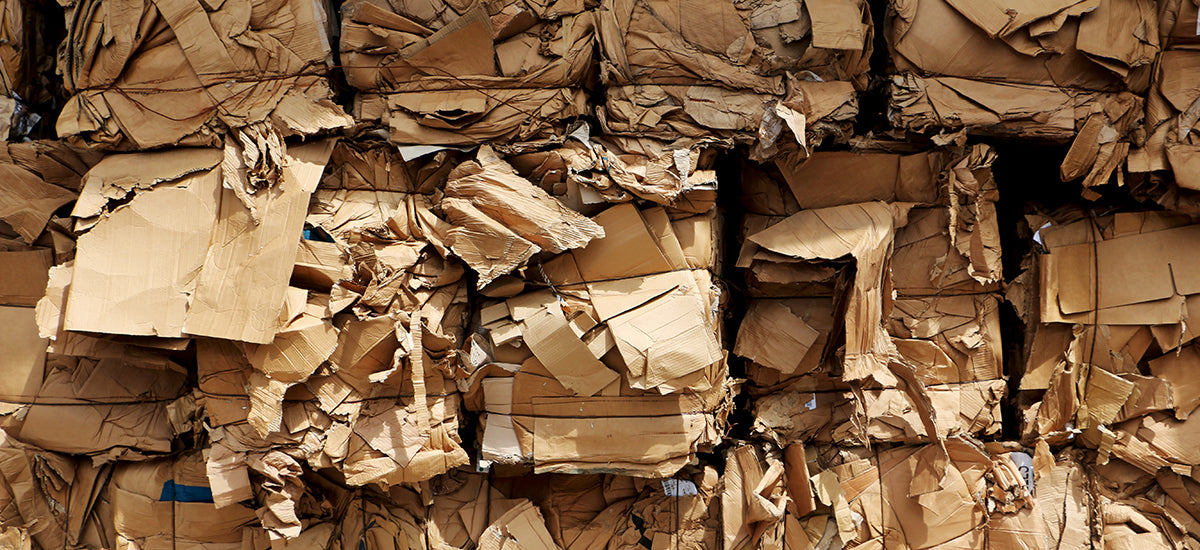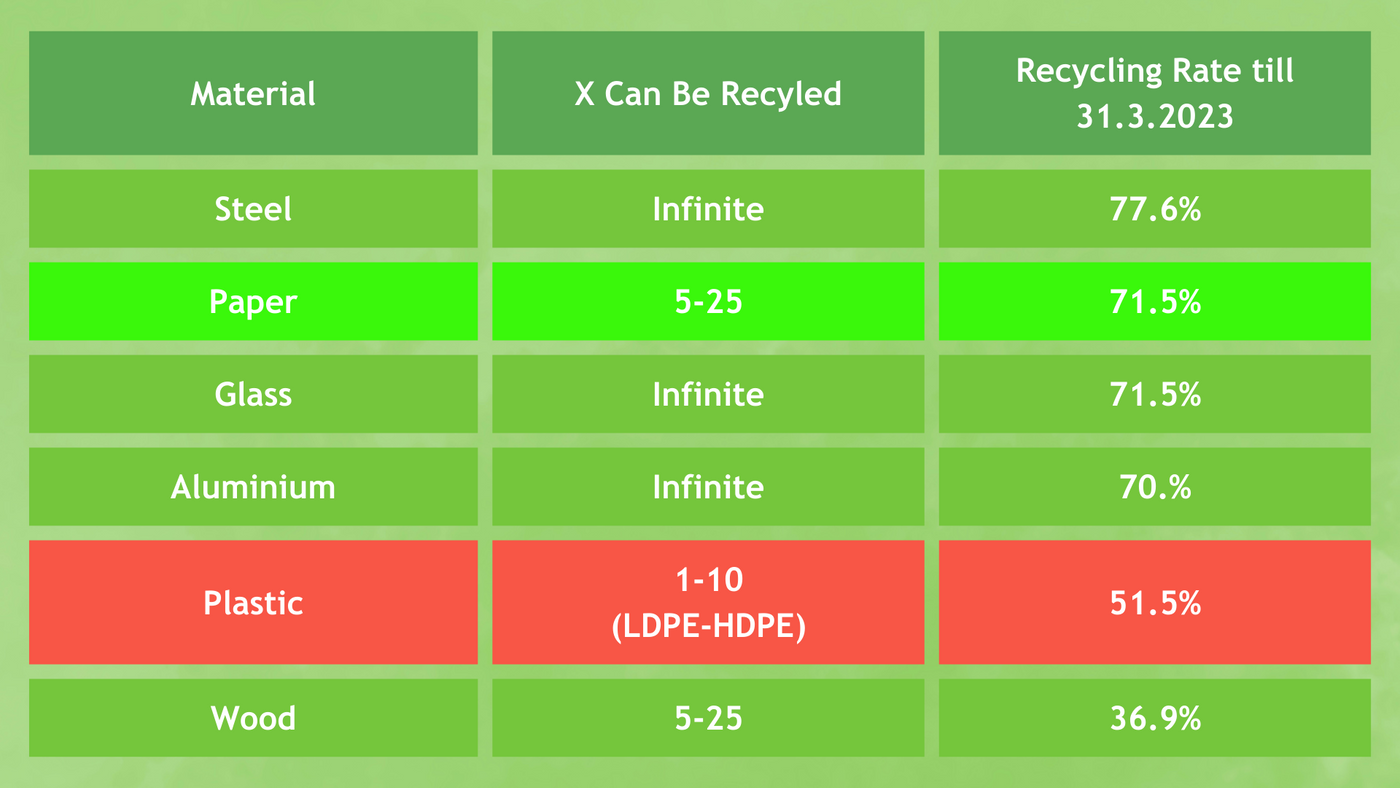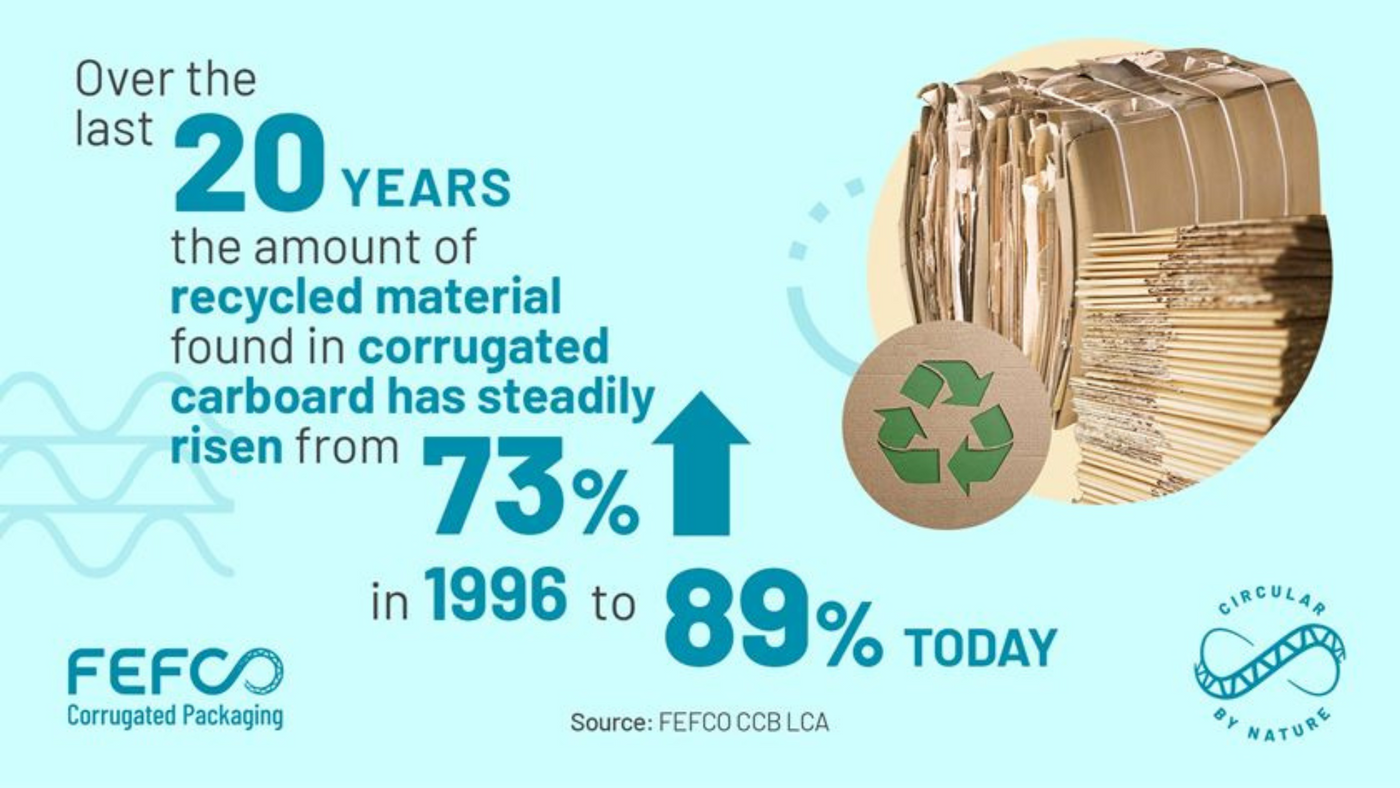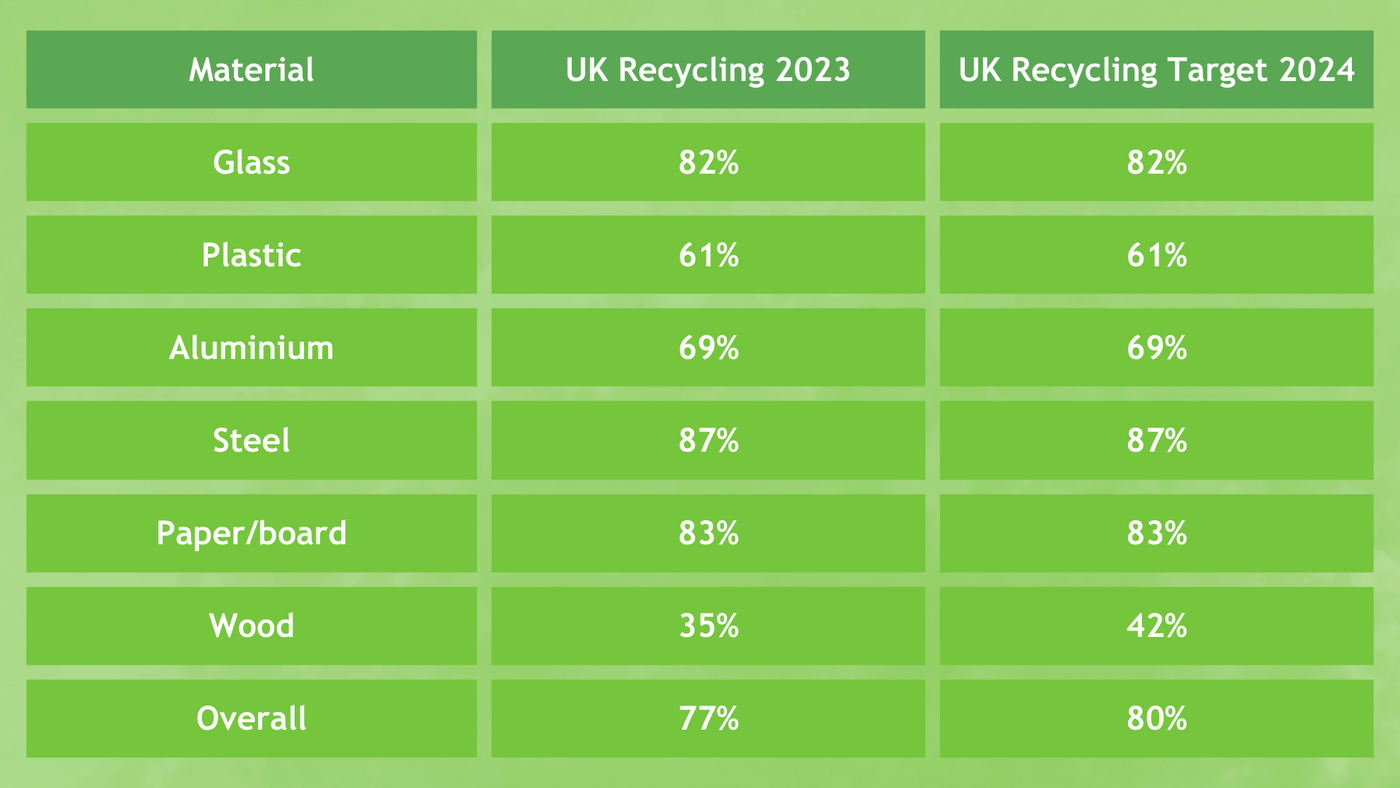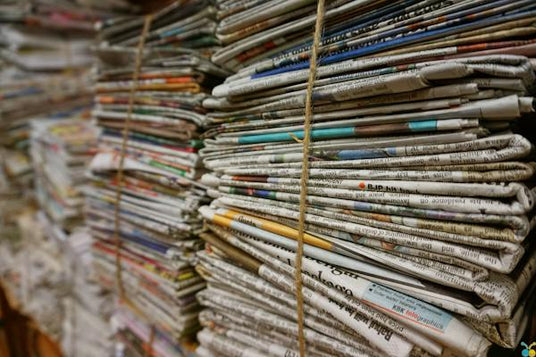
Recycling In The UK
- British households generate over 26 million tonnes of waste annually, equivalent to the weight of about 260 large cruise ships.
- Each person in the UK discards approximately 400kg of waste annually, around seven times their body weight.
- Of the 26 million tonnes of waste, 12 million tonnes are recycled, while 14 million tonnes end up in landfills, resulting in a 45% average recycling rate.
- Wales leads in recycling with 57%, followed by Northern Ireland with 46%, while Scotland and England trail slightly behind.
- Despite a target set by the UK government to recycle 50% of household waste by 2020, the current rate shows only a 3% increase since 2010.
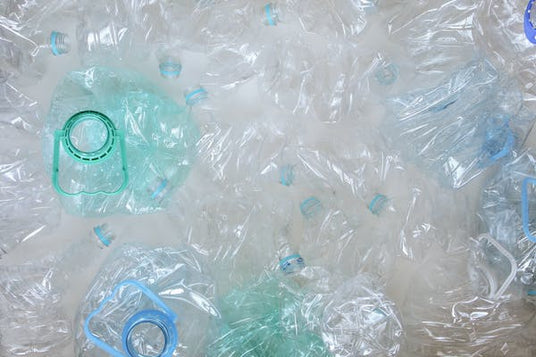
The Impact of Waste
- Recycling a single aluminium can save enough energy to power a TV for up to three hours or an iPod for twenty hours.
- Recycling all items in kitchen recycling bins could power a TV for six months.
- A single glass bottle can power a laptop for half an hour.
- Recycling five plastic bottles can produce enough insulating fibre for a ski jacket.
- Recycling paper requires 70% less energy than producing it from raw materials.
- UK households create 7 million tonnes of food waste annually, with an estimated 50% still edible and recyclable.
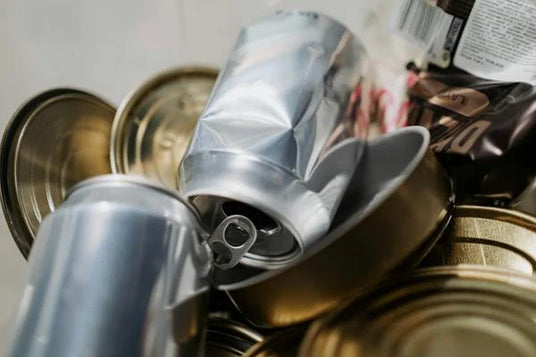
Recycling Facts By Material
- Aluminium cans are highly recyclable, with each can back on shelves within 60 days.
- Steel cans are 100% recyclable and can be repurposed into various products.
- Glass is infinitely recyclable, with less energy required for recycling than for producing new glass.
- Despite many plastics being recyclable, only 45% of plastic waste is recycled in the UK.
Our Recycling FAQ's
Recycled Packaging Knowledge Panel
What is recycled packaging?
What is recycled packaging?
- Recycled packaging refers to materials that have been previously used and then reprocessed into new packaging products. These materials can include paper, cardboard, plastics, glass, and metal.
How is recycled packaging beneficial?
How is recycled packaging beneficial?
Recycled packaging reduces the demand for virgin materials, conserves natural resources, and minimizes the amount of waste sent to landfills. It also helps lower energy consumption and greenhouse gas emissions associated with manufacturing new materials.
Is recycled packaging as durable as non-recycled packaging?
Is recycled packaging as durable as non-recycled packaging?
- Yes, recycled packaging can be just as durable and effective as non-recycled packaging. Advances in technology have made it possible to produce high-quality packaging materials from recycled materials without compromising on strength or functionality.
What is the difference between recyclable and sustainable packaging?
What is the difference between recyclable and sustainable packaging?
Provide an answer to the question here, with as much detail as possible to help your customers.
What types of materials can be recycled for packaging?
What types of materials can be recycled for packaging?
A wide range of materials can be recycled for packaging, including paper, cardboard, corrugated board, plastics (such as PET, HDPE, LDPE), glass, and metal (such as aluminum and steel).
How can I identify recycled packaging?
How can I identify recycled packaging?
Look for labels or symbols indicating that the packaging is made from recycled materials. Common symbols include the Mobius loop (♻) and specific percentage indications, such as "100% recycled" or "Made with X% recycled materials.
Can all types of packaging be recycled?
Can all types of packaging be recycled?
While many types of packaging can be recycled, it's essential to check with local recycling guidelines to ensure proper disposal. Some materials may require special processing or cannot be recycled easily due to contamination or other factors.
Is recycled packaging more expensive than non-recycled packaging?
Is recycled packaging more expensive than non-recycled packaging?
In some cases, recycled packaging may be slightly more expensive due to the cost of collecting, sorting, and processing recycled materials. However, the long-term benefits, including environmental sustainability and brand reputation, often outweigh the initial costs.
What is the difference between recyclable and sustainable packaging?
What is the difference between recyclable and sustainable packaging?
Recyclable packaging can be processed and reused in manufacturing, while sustainable packaging considers the entire lifecycle impact, including material sourcing, production, use, and end-of-life disposal, aiming for minimal environmental impact throughout.
How important is recyclable packaging to consumers?
How important is recyclable packaging to consumers?
Recyclable packaging is increasingly important to consumers who prioritize sustainability. It demonstrates a commitment to environmental responsibility and can positively influence purchasing decisions.
What is the best eco-friendly packaging?
What is the best eco-friendly packaging?
The best eco-friendly packaging prioritises recyclability, use of recycled materials, minimal environmental impact throughout its lifecycle, and compatibility with existing waste management systems.
What is the most recycled packaging?
What is the most recycled packaging?
Cardboard and paper packaging are among the most recycled packaging materials due to their high recyclability and widespread use in various industries.
How can I dispose of recycled packaging responsibly?
How can I dispose of recycled packaging responsibly?
To dispose of recycled packaging responsibly, ensure it is clean and free of contaminants, follow local recycling guidelines, and separate it from other waste materials. Consider reusing or repurposing packaging whenever possible to further reduce waste.
The Advantages of Choosing Lil Packaging
How can I ensure that my business is making a positive impact by choosing recycled packaging?
How can I ensure that my business is making a positive impact by choosing recycled packaging?
By choosing Lil Packaging's recycled packaging solutions, you are actively contributing to environmental conservation efforts. You can proudly communicate your commitment to sustainability to your customers, enhancing your brand reputation and attracting environmentally conscious consumers.
Does Lil Packaging offer recycled packaging options?
Does Lil Packaging offer recycled packaging options?
Yes, at Lil Packaging, we are committed to sustainability and offer a range of packaging solutions made from recycled materials. Our products are designed to meet your packaging needs while minimizing environmental impact.
Can Lil Packaging provide custom recycled packaging solutions?
Can Lil Packaging provide custom recycled packaging solutions?
Absolutely! Lil Packaging offers customisable recycled packaging solutions tailored to your unique requirements. Whether you need branded packaging, specific sizes, or special features, we can work with you to create environmentally friendly packaging that aligns with your brand and values.
Are Lil Packaging's recycled packaging products recyclable?
Are Lil Packaging's recycled packaging products recyclable?
Yes, our recycled packaging products are designed to be recyclable at the end of their lifecycle. We encourage customers to responsibly recycle our packaging materials to further support the circular economy and minimise waste.
Why should I choose Lil Packaging for recycled packaging?
Why should I choose Lil Packaging for recycled packaging?
Lil Packaging is committed to sustainability and environmental stewardship. We prioritize the use of recycled materials in our packaging products, reducing the environmental impact of our operations. Our recycled packaging solutions are high-quality, cost-effective, and customisable to meet your specific needs.

